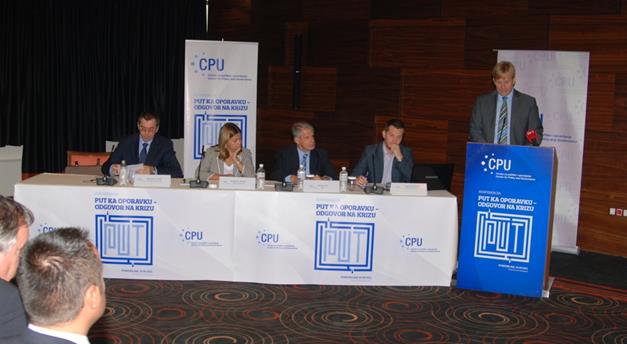
The conference „Road to recovery – Response to crisis“organized by the Centre for Policy and Governance was held on 24/09/2012 discussing public expenditure and investments in energy and transport sector. Nermin Nikšić, prime minister of FBiH, and Peter Sorensen, Head of EU Delegation to BiH opened the conference. The conference was conceived in three thematic panels. The first was discussion on public expenditure and investments generally during crisis, the second on investments in energy sector, and the third on investments in transport infrastructure.
Peter Sorensen, Head of EU Delegation to BiH, pointed that there are no quick solutions for economic recovery of the country, but BiH will have to make preparations due to Croatia’s accession to EU, because BiH can easily lose huge market, and thus large number of jobs.
Nermin Nikšić, prime minister og FBiH emphasized that effects of the crisis in BiH are less concerning comparing to surrounding countries and that MMF arrangement ensures BiH should the crisis become deeper.
“Structural directions of the fourth stand-by arrangement with the MMF contained in the letter of intent represent continuity of the government’s policy directed towards savings, even and fair distribution of public funds and regulate conditions in certain budget payments” Nikšić said.
Nikšić concluded that intensifying of investment activities, combining with responsible and restrictive policy, is the best possible answer to crisis.
Naida Kadribegović, director of CPU, emphasized that local governments within recent negotiations with the MMF already committed themselves to continuing restrictive fiscal policy, savings, and simultaneously, there are intensified investments in the infrastructure.
Within three thematic panels, the participants discussed on measures that governments are conducting as a response to economic crisis, and analyzed possible solutions.
On the first panel, participants were Anabela Abreu, head of World Bank Office in BiH, Milan Cuc, representative of MMF in BiH and Miroslav Tomić, advisor of Minister of Finances of BiH. In order to increase foreign investments it is necessary to improve business environment, simplifying tax system, which is along with decrease of fiscal burden, a key to decrease unemployment. Furthermore, it is necessary to continue with the process of fiscal consolidation, lower the expenditure, especially in sector of social welfare, and to continue with the reforms in sector of public management. It is also a priority to increase the flexibility of labor market, and to harmonize education system with labor market needs.
Abreu thinks that BiH, unless it is already in recession, then it is on verge of it and the first step is to reduce current public expenditure, but also needs to consider “the most vulnerable groups of population”.
“Thirteen percent of GDP on salaries in administration is unsustainable, and also there are high benefits for retirement and it is necessary to more strict measures for early retirement”, Abreu thinks, adding that governments and social partners in BiH should look further than tomorrow because reforms are necessary.
The panel emphasized the lack of quality coordination in macroeconomic and fiscal policies in BiH as one of the key issues, and it is necessary to improve coordination between entities, and their coordination with lower levels of governance. Further borrowings should be carefully considered, and exclusively directed in the area of public investments.
On the second panel, dedicated to investments in energy sector, the participants were Erdal Trhulj, minister of Federal Ministry of Energy, Mining and Industry, Elvedin Grabovica, director of Elektroprivreda BiH, Nikola Krešić, director of Elektroprivreda HZHB and Mirza Kušljugić, expert in areas of energetics, and concluded that is necessary to improve institutional and administrative capacities to implement new laws and project preparations.
“Additional analysis of subsidy policies in production, distribution, and expenditure of energy is needed in order to produce optimal solutions, while the legal framework should create encironment to stimulate domestic and foreign investments. In this respect, adoption of seven laws in energy sector in BiH is expected, which will create the framework to expedite investments in this sector in 2013.” points Lejla Dragnić from Centre for Policy and Governance.
Also, when speaking of “green energy” it is necessary to analyze carefully adequacy and possibility of production in BiH. BiH should be actively involved in the implementation of Action plan to establish regional market for electric energy. I the area of energy efficiency, particular emphasis should be in sector of building construction.
On the third panel, dedicated to investments in transport infrastructure, speakers were Enver Bijedić, minister of Federal Ministry of Transport and Communications, Ensar Karić, director of Public Company Motorways of FBiH and Josip Jelić, EBRD BiH. They concluded that significant progress was made during the construction of Koridor Vc. Intensifying work offers opportunity to increase employment and improve competitiveness of the country, because the improved transport infrastructure eases the movement of labor force, commodities and services.
To further expedite the construction of the highway it is necessary to adopt, or to improve legal framework by adopting Public-Private Partnership Law in FBiH. This would create additional possibilities for construction of highways, especially because EBRD, as one of the major creditors, is changing business model, and will focus more on crediting the private sector. Also it is necessary to revise Concession Law in FBiH, and to adopt Physical plan of FBiH.
Prime minister Nikšić said that Public Company Motorways of FBiH in the next three year period will construct more than 46 km of new highway on Koridor 5-C and 10 km of Sarajevo ring road and implement more than 500 million euros of investments by the end of 2014.
Over a hundred of participants attended the conference, high government officials, representatives of public sector and international organizations. The participants of the conference “Road to recovery – Response to crisis” concluded that although the governments continued with restriction measures through public spending restrictions, it is possible that BiH with increased public investments partially reversed negative effects of global crisis.

